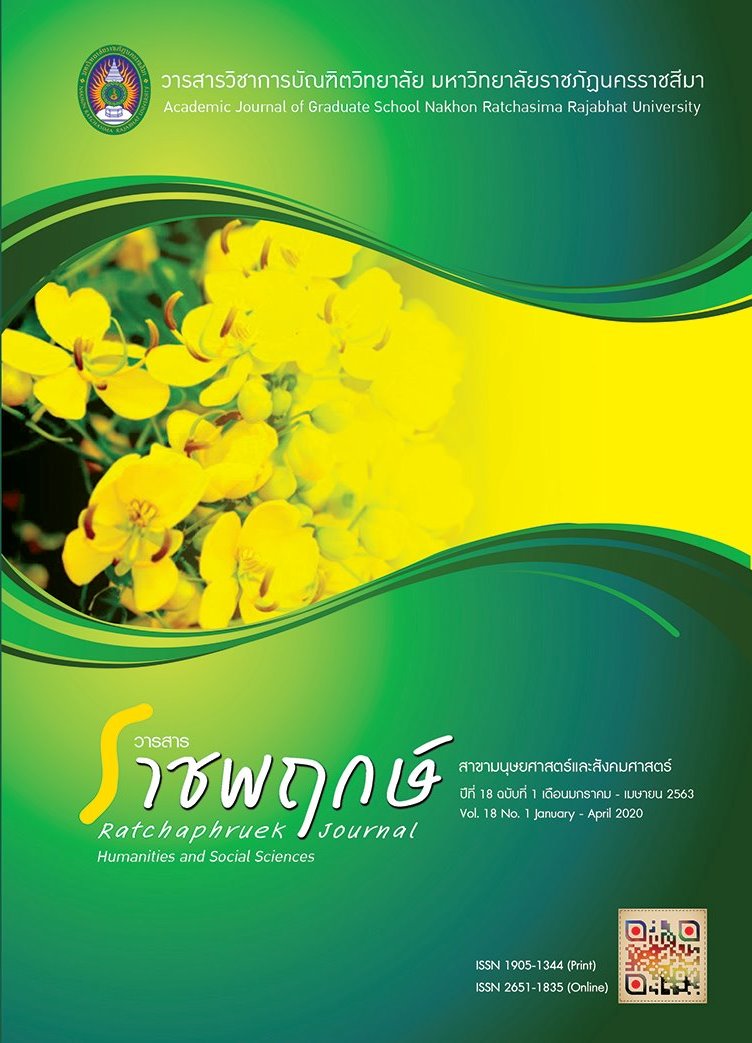Development of Learning Management Model on Cloud Computing System Based on Connectivism to Enhance Information and Communication Technology Literacy for Undergraduate Students
Main Article Content
Abstract
This research aimed to 1) study the learning management model on the cloud computing, 2) develop the learning management model on the cloud computing, and 3) study the effect of using the learning management model on cloud computing.
The participants of this study used in the experiment were 30 undergraduate students of Suan Dusit University that studying in the course on computer technology and application programs for learning management obtain from cluster random sampling. The research tools were: 1) learning management on cloud computing system, 2) learning achievement test, 3) rubric assessment of Information and communication technology skills and 5) satisfaction questionnaire. Statistics were analyzed using mean, standard deviation and and dependent samples t-test.
The research results revealed that: 1. The developed Learning Management Model on Cloud Computing comprised 5 components: 1) the learning management system 2) learning environment 3) Cloud computing or cloud service 4) Students, teachers, and system managers evaluated by experts at the highest level, mean 4.58, and standard deviation 0.49 2. The achievement scores of students higher than before learning were statistically significant at .05 level. 3. Information and communication technology literacy skills assessed from the learner's portfolio was averaged at 73.7 a good level. 4. Students satisfied with the learning system development was at a high level, mean 4.64, and standard deviation 0.45
Article Details
References
กุลชัย กุลตวนิช. (2557). ระบบการเรียนบนห้องเรียนเสมือนแบบคลาวด์ตามแนวคิดการเรียนรู้คอนเน็คติวิสม์เพื่อส่งเสริมการรู้สารสนเทศและการรับรู้ความสามารถของตนเองด้านการรู้สารสนเทศสำหรับนิสิตนักศึกษาปริญญาตรี. วิทยานิพนธ์ ครุศาสตรดุษฎีบัณฑิต สาขาวิชาเทคโนโลยีและสื่อสารการศึกษา, จุฬาลงกรณ์มหาวิทยาลัย.
ถนอมพร เลาหจรัสแสง. (2549). ระบบบริหารจัดการการเรียนรู้แห่งอนาคต: Next-Generation Learning Management System. สืบค้นเมื่อ 29 กันยายน 2559, จาก http://thanompo.edu. cmu.ac.th,
เสมอกาญจน์ โสภณหิรัญรักษ์ และ ปราวีณยา สุวรรณณัฐโชติ. (2555). “มุมมองของผู้สนับสนุนการเปลี่ยนแปลงในโปรแกรมอีเลิร์นนิง เพื่อการส่งเสริมการนำการเรียนการสอนแบบอีเลิร์นนิงไปใช้ใน ระดับอุดมศึกษา (Perspective of Change Facilitators in eLearning Program for Promoting e-Learning Implementation in Higher Education)”, การประชุมวิชาการ ระดับชาติด้าน อีเลิร์นนิง บูรณาการการเรียนรู้ออนไลน์ประชาคม อาเซียน: นโยบายและกระบวนการ (Integrating ASEAN Online learning: Policy and Process, 73-80.
อนุชิต อนุพันธ์ และ ปณิตา วรรณพิรุณ. (2556). การออกแบบระบบสารสนเทศเพื่อการจัดการความรู้เพื่อสนับสนุนการสร้างองค์ความรู้ผ่านสภาพแวดล้อมแบบคลาวด์ สำหรับสถาบันอุดมศึกษา. Paper presented at the NEC2013: TCU National e- Learning Conference 2013.
Aaron, L.S. and C.M. Roche. (2011). Teaching, learning, and collaborating in the cloud:
Applications of cloud computing for educators in post-secondary institutions. Journal of Educational Technology Systems 40(2): 95-111.
Denton, D.W. (2012). Enhancing instruction through constructivism, cooperative learning, and cloud computing. TechTrends 56(4): 34-41.
Harasim, L. (2012). Learning Theory and Online Technologies. London: Routledge.
McGee, P. (2003). Course Management Systems for Learning: Future Designs. Retrieved August 1, 2016, from http://coehd.utsa.edu/users/pmcgee/ngcms.htm#topics.
Siemens, G. (2004). Connectivism: A Learning Theory for the Digital Age. Retrieved June 25, 2016, from http://www.elearnspace.org/Articles/connectivism.htm.
Siemens, G. (2005). Connectivism: A learning theory for the digital age.
International of Instructional Technology and Distance Learning 2(1): 3-10.
Unesco. (2008). Strategy Framework for promoting ICT literacy in the Asia-Pacific region. Unesco Bangkok: Printed in Thailand.


